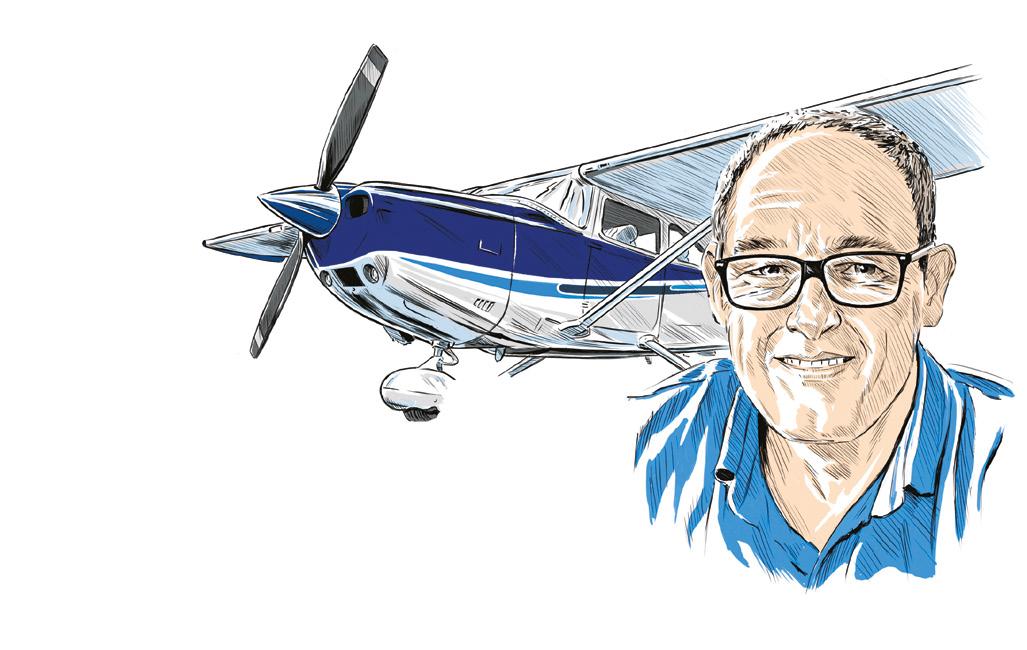
4 minute read
Squawks Ian Seager
Only time will tell…
At this year’s LAA Rally Grant Shapps, the UK’s Secretary of State for Transport (and a private pilot), dropped by the FLYER stand and invited me, along with a couple of other people, to ‘come in and discuss the potential for further deregulation’. I wasn’t sure the meeting would actually take place, but it did, and it happened yesterday.
Advertisement
I’m not aligned politically with the SoS, but he has positively engaged with GA more than any other politician since… well, probably since, forever. That’s not to say that we all have to blindly agree with everything he does, thinks or proposes, but it’s important to recognise the level of both support and ambition that’s currently heading up the Department for Transport.
It’s difficult to know what to expect of meetings like this – it’s unlikely that an hour spent chatting to someone, even if they can pull most of the strings, will result in large scale instant improvements, but given the amount of time many of us spend complaining about things it would be churlish not to take the opportunity to try to make some things better when the opportunity arises.
It won’t come as a surprise that the area of pilot licensing was raised. As far as I’m aware, nobody in GA, the DfT or the CAA thinks that the current arrangements are satisfactory, and there’s work going on to simplify things while remaining (where necessary) aligned with ICAO. Personally, and I made this point, I think the CAA could have scored a couple of quick wins on the licensing front, for example by trusting its appointed examiners to ensure that candidates have the hours/experience required, rather than insisting that logboks are physically sent to the CAA. Surely if you trust the examiner to examine the flying you should be able to trust them with this?
The subject of RNP Approaches was also discussed – about half a million years ago, when the USA already had hundreds, if not thousands, of what were then called GPS approaches – the UK ran a trial, presumably to make sure that the magic worked in our air. It did, and ever so slowly the process of introducing them to the UK began. There’s been lots of air under the wings since then and parts of the CAA has done lots of work on procedures for RNP approaches at airfields without a full air traffic control service. Literally millions has been spent by airfields and associated businesses to achieve not very much at all. Those few GA airfields that have managed to get approaches approved and in the databases have only managed to them over the line by restricting their use to the point where, practically speaking, the approaches are pretty much unavailable to general aviation pilots.
Kudos to Grant Shapps who managed to get significant refunds issued to some applicants basically as a result of the slow progress. The point was made that we need to cut through whatever bullshit is getting in the way (OK, I didn’t actually say bullshit) and deliver the right outcome – RNP approaches, where they exist, must be easily available to general aviation. It seemed to me that the SoS shares the frustration here. There’s no avoiding Brexit in this discussion, and it should be clear to both leavers and remainers that the end of the transition period (and leaving EASA) brings both opportunities and problems. The mutual recognition of licences, particularly professional licences, is a significant and growing problem that sadly doesn’t appear to have a near-term solution. In a similar vein, the issue of certification was also discussed. I personally think there’s a big win to be had for the UK General Aviation world by accepting both EASA and FAA certification without requiring CAA validation, and by adopting things like CSSTAN where they bring advantages. It would mean that UK pilots have access to the latest equipment as soon as it becomes available, it would keep costs down for everyone, and unless you think that the FAA and EASA certification teams are a ‘bunch of clowns who cannot possibly be trusted’, it would not be detrimental to safety. It would also solve the problem of some manufacturers not certifying in the UK because the market for their goods is deemed to be too small. Unfortunately my view is not shared by Grant Shapps, and as an independent aviation nation it seems we will have our own certification standards and processes. I fear many hours will be spent on the reinvention of a better, less circular wheel and its subsequent inspections.
The new CAA independent dispute review process was also covered, with the official process of finding and appointing a Chair to begin soon. Airspace, Electronic Conspicuity, the environment – plus more topics were also covered. I also tried (and I think failed) to explain why the DfT’s decision to require FAA certified pilots to hold equivalent UK licences to fly N reg aircraft in the UK from 21 December is indicative of old school bureaucratic thinking. Only time will tell if the hour was a quick peek behind the curtain or the beginnings of something more productive. There were 13 different action points noted during the meeting, I’ll report back on progress….
Publisher, pre C-19 often found flying something new and interesting
ics@seager.aero







